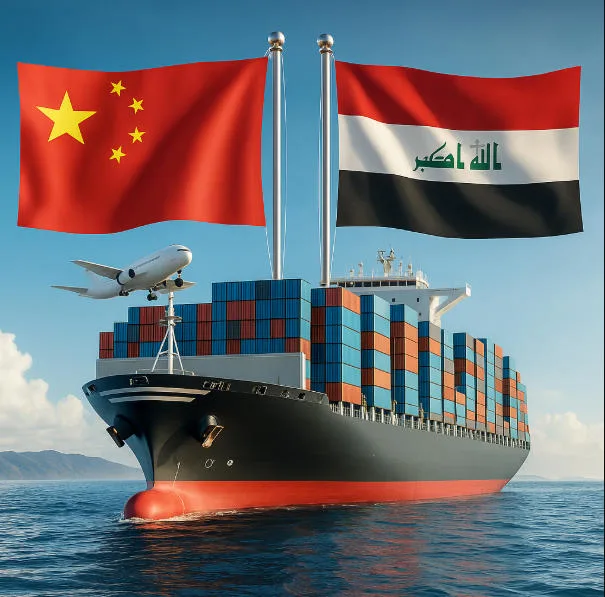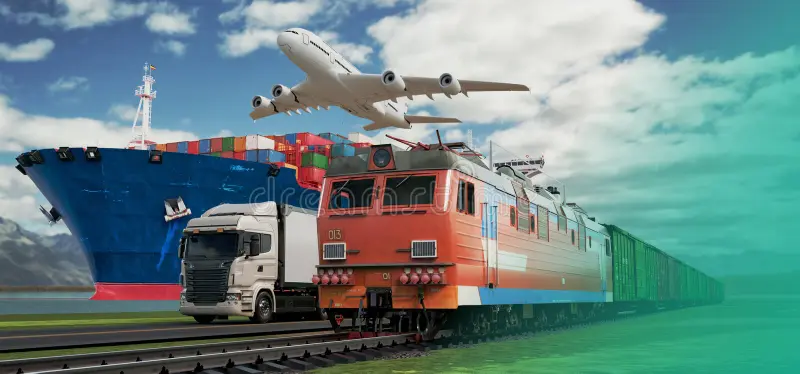- By TOP CHINA FREIGHT
- September 12, 2025
- Shipping
Table of Contents
Shipping goods from China to Iraq has become increasingly important for businesses importing electronics, machinery, textiles, and industrial supplies. Understanding the logistics, shipping costs, and transit options ensures smooth operations, reduces delays, and minimizes unexpected expenses. This guide explains shipping methods, cost structures, customs documentation, transit schedules, and practical strategies to optimize your supply chain from China to Iraq.

What factors affect shipping from China to Iraq?
Several variables influence China to Iraq shipping:
1.Cargo weight and volume:
Heavier or bulkier shipments cost more.
2.Shipping mode:
Air, sea, and rail differ in speed and cost.
3.Origin and destination:
Port locations affect handling and local fees.
4.Customs and duties:
Import taxes and VAT increase landed costs.
5.Seasonal demand:
Peak seasons like Chinese New Year often raise prices.
6.Cargo type:
Fragile, hazardous, or perishable items require extra handling or insurance.
Understanding these factors helps businesses request accurate freight quotes, plan budgets, and reduce hidden costs. Comparing multiple freight forwarders ensures competitive rates and service quality.
How long does shipping from China to Iraq take?
Transit times depend on shipping method:
| Shipping Method | Estimated Transit Time | Notes |
|---|---|---|
| Air Freight | 5–10 days | Fast, ideal for urgent cargo |
| Sea Freight LCL | 20–30 days | Cost-effective for small shipments |
| Sea Freight FCL | 18–28 days | Best for bulk goods, full container |
| Rail Freight | 15–25 days | Limited routes but eco-friendly |
Air freight offers the fastest delivery, while sea freight is economical for larger shipments. Rail is a viable option for regional destinations with fixed infrastructure.
What are the shipping cost considerations?

Shipping costs from China to Iraq depend on:
- Weight and volume (chargeable weight for air freight)
- Container type (20ft, 40ft, FCL vs LCL)
- Mode of transport (air, sea, rail)
- Insurance and handling fees
- Customs duties and taxes
| Container Type | Approximate Cost (USD) | Best Use |
|---|---|---|
| 20ft FCL | $1,800–$3,000 | Standard bulk shipments |
| 40ft FCL | $3,200–$5,000 | Large-scale imports |
| LCL per cbm | $40–$70 | Small shipments |
Proper cost planning ensures accurate budgeting and reduces the risk of unexpected fees.
How do customs procedures impact shipments?

Customs clearance in Iraq requires proper documentation to avoid delays:
| Required Document | Purpose |
|---|---|
| Commercial Invoice | Declares value of goods |
| Packing List | Details contents for inspection |
| Bill of Lading / AWB | Proof of shipment |
| Certificate of Origin | Confirms country of manufacture |
| Import License | Required for regulated items |
| Customs Declaration | Determines duties and VAT |
Working with experienced freight forwarders ensures smooth clearance and timely delivery.
What shipping methods are available from China to Iraq?

Air Freight
Air freight is suitable for high-value, time-sensitive shipments. It ensures faster delivery but comes at higher per kg rates.
Sea Freight
Sea freight is ideal for bulk shipments. LCL is economical for smaller loads, while FCL maximizes cost-efficiency for full containers.
Rail Freight
Rail is limited but offers eco-friendly alternatives for regional destinations, often combining with road transport for final delivery.
Why cargo type matters in shipping?
Cargo characteristics affect both cost and handling:
- Fragile goods need protective packaging
- Oversized cargo may require special permits
- Perishable items need refrigerated transport
Accurate classification avoids customs penalties and reduces shipping risk.
How can businesses reduce shipping costs?
Combine small shipments to lower per-unit cost
Avoid peak seasons
Mix air and sea freight
Reduce volumetric weight
Accurate documents prevent demurrage fees
Case Study: Machinery Importer in Basra

A Basra-based company imported industrial machinery from Shanghai. Initially, they used air freight for all shipments, paying $9 per kg. By switching non-urgent orders to sea freight and reserving air for urgent parts, they cut average shipping costs by 45% annually, maintaining delivery reliability.
Do express couriers offer better options?
Express couriers provide door-to-door delivery with faster transit times, but costs are higher. They are best for small, urgent shipments. Standard freight remains more economical for bulk cargo.
| Service Type | Cost per Kg | Transit Time | Best For |
|---|---|---|---|
| Express Courier | $10–$15 | 3–6 days | Samples, urgent parcels |
| Air Freight | $5–$9 | 5–10 days | Time-sensitive shipments |
| Sea Freight LCL | $0.8–$2 | 20–30 days | Small-to-medium bulk |
How Technology Improves China to Iraq Logistics
Technology streamlines shipping from China to Iraq, improving efficiency, visibility, and cost management.
1.Real-Time Tracking:
GPS and IoT devices allow continuous cargo monitoring, reducing delays and loss.
2.Automated Documentation:
Digital invoices, packing lists, and customs forms minimize errors and ensure compliance.
3.Freight Cost Tools:
Online calculators help compare air, sea, and rail rates for budget optimization.
4.Predictive Analytics:
Historical data forecasts transit times and potential disruptions.
5.Enhanced Communication:
Cloud platforms connect suppliers, forwarders, and brokers for smoother coordination.
By adopting these tools, businesses can reduce risks, cut costs, and ensure timely delivery while maintaining supply chain visibility.
Conclusion
Shipping from China to Iraq requires careful planning of shipping mode, cargo type, customs clearance, and cost management. By understanding these variables, optimizing packaging, and partnering with experienced freight forwarders, businesses can secure cost-effective solutions, timely delivery, and a smooth supply chain.
Need a Shipping Quote?
If you want expert guidance and peace of mind, our team is ready to assist.
TJ China Freight offers tailored solutions to help businesses of all sizes ship more reliably from China.

FAQ
Q1:Can I reduce shipping costs from China to Iraq?
Yes, consolidate shipments, use sea freight for bulk items, optimize packaging, and avoid peak shipping seasons to lower per kg costs.
Q2:What customs documents are required for Iraq imports?
Key documents include commercial invoice, packing list, bill of lading, certificate of origin, import license, and customs declaration. Accurate documentation ensures faster clearance.
Q3:Is air freight suitable for all goods?
Air freight is ideal for high-value, urgent, or fragile shipments. Bulk or heavy cargo is usually more economical via sea freight.
Q4:How does cargo type impact shipping costs?
Fragile, oversized, or perishable goods require special handling or refrigeration, increasing shipping rates. Proper packaging and classification reduce additional charges.
Q5:Are express courier services cost-effective for Iraq shipments?
Couriers provide faster, door-to-door delivery for small shipments, but per kg rates are higher than standard air or sea freight.
